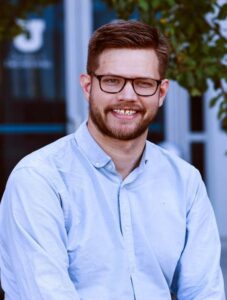 University of Utah School of Computing assistant professor Tucker Hermans has received the National Science Foundation’s Faculty Early Career Development Program (CAREER) award for his research into the development of machine-learning algorithms to improve the manipulation of multi-fingered robots.
University of Utah School of Computing assistant professor Tucker Hermans has received the National Science Foundation’s Faculty Early Career Development Program (CAREER) award for his research into the development of machine-learning algorithms to improve the manipulation of multi-fingered robots.
He is the fourth U College of Engineering faculty member to so far receive the award for 2019. The award is handed out to “early-career faculty who have the potential to serve as academic role models in research and education and to lead advances in the mission of their department or organization.”
Hermans, who has been with the U since 2015, is receiving $532,000 over five years for research into “Improving Multi-Fingered Manipulation by Unifying Learning and Planning.”
When robotic hands pick up an object, they typically have a difficult time adjusting the object to a different position to use it, for example picking up a pen and then repositioning it to write with it. That’s because the robot may not have the prior knowledge about the object and how it is to be picked up and held based on its size, weight, mass and other parameters.
But Hermans and his team are researching a combination of computer models and machine learning so a robot can predict the parameters of an object in order to learn how to effectively grab and use it. The researchers will develop software and computing procedures that work with a robot’s sensors — cameras and tactile sensors — to generate the correct data for figuring out how to correctly use an object.
Ultimately, Hermans hopes that such technology might lead to robots that can act as assistants for older people or people with disabilities who need help with daily tasks. In the short term, he also believes the technology can improve on existing manufacturing robots or robots used in packaging goods for online retail sales.
“I’m very excited to be able to do this work, and I’m very honored that the reviewers thought it was worthy work to do. It’s good to feel that from my peers,” he said. Hermans received a master’s in computer science and a doctorate in robotics, both from the Georgia Institute of Technology.
In addition to Hermans, NSF CAREER awards have so far been issued to three other College of Engineering faculty members, including chemical engineering assistant professor Michael Hoepfner, mechanical engineering assistant professor Owen Kingstedt and biomedical engineering assistant professor Jessica Kramer.